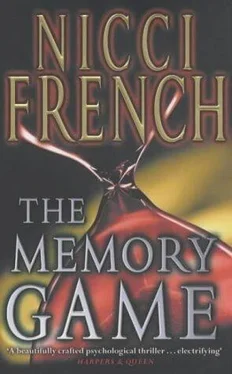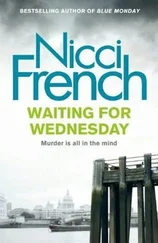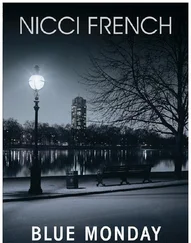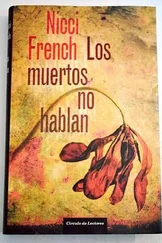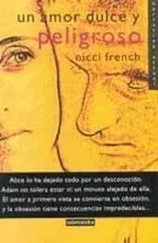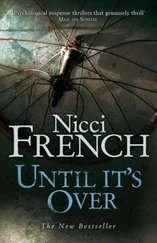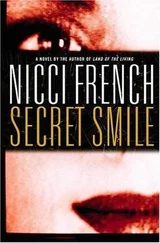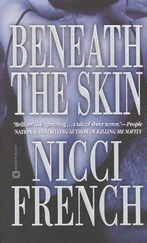Nicci French - The Memory Game
Здесь есть возможность читать онлайн «Nicci French - The Memory Game» весь текст электронной книги совершенно бесплатно (целиком полную версию без сокращений). В некоторых случаях можно слушать аудио, скачать через торрент в формате fb2 и присутствует краткое содержание. Жанр: Триллер, на английском языке. Описание произведения, (предисловие) а так же отзывы посетителей доступны на портале библиотеки ЛибКат.
- Название:The Memory Game
- Автор:
- Жанр:
- Год:неизвестен
- ISBN:нет данных
- Рейтинг книги:4 / 5. Голосов: 1
-
Избранное:Добавить в избранное
- Отзывы:
-
Ваша оценка:
- 80
- 1
- 2
- 3
- 4
- 5
The Memory Game: краткое содержание, описание и аннотация
Предлагаем к чтению аннотацию, описание, краткое содержание или предисловие (зависит от того, что написал сам автор книги «The Memory Game»). Если вы не нашли необходимую информацию о книге — напишите в комментариях, мы постараемся отыскать её.
The Memory Game — читать онлайн бесплатно полную книгу (весь текст) целиком
Ниже представлен текст книги, разбитый по страницам. Система сохранения места последней прочитанной страницы, позволяет с удобством читать онлайн бесплатно книгу «The Memory Game», без необходимости каждый раз заново искать на чём Вы остановились. Поставьте закладку, и сможете в любой момент перейти на страницу, на которой закончили чтение.
Интервал:
Закладка:
‘Are you hungry?’
‘No, I’m not.’
‘Then I’m afraid you’ll have to watch me eat. Come through to the kitchen. No smoking, I’m afraid,’ she said, noticing the cigarette in my hand. I tossed it back onto the path. In the kitchen she poured herself a glass of chianti and I asked for nothing but tap water.
‘Since you’re not eating, I’ll just nibble a bit,’ she said. ‘Now what was it you wanted to see me about.’
And as we talked she prepared and ate the most enormous selection of food: pistachios, olives stuffed with anchovies and chillies, tortilla chips dipped in a guacamole from the fridge, focaccia with mozzarella and Parma ham with a large splash of olive oil.
‘Are you a psychoanalyst?’
‘No, I’m a psychiatrist. Does it matter?’
‘You know what happened to me, what I’ve done, don’t you?’
‘I think so. But you tell me.’
God, I wanted a cigarette. To help me think. For something to do with my hands. I had to concentrate.
‘I’ve been in therapy with Alex Dermot-Brown since November. I’d had some emotional problems after the body of my dear friend, Natalie, was found. She’d gone missing in the summer of 1969. Alex was particularly interested when I told him that I had been close by when she was last seen alive. We worked over and over that scene, visualising it, and I gradually recovered the memory of seeing her being murdered by her father, my father-in-law, Alan Martello. I confronted him with it and he confessed. He’s now… well, you’ve read the papers.’
‘Yes, I have.’
‘I’ve got to ask you something, Dr Scott. Two things, really. Is it possible that someone would confess to a crime they hadn’t committed? I mean, why would they?’
‘Hang on a second,’ Dr Scott said. ‘This takes concentration.’ She was slicing her focaccia construction into sections. ‘There we are. Now, why would you want to ask me that?’
‘What I really want to ask is, is it possible to remember something that then turns out to be false? I mean a clear, detailed visual memory.’ She started to reply but I carried on speaking. ‘I felt I was doing something like retrieving a file on my computer that had been accidentally lost. Once I’d got it back I would never doubt that it was the actual file that I’d typed, would I?’
Dr Scott was now seated at the kitchen table with plates of food radiating out from her. When it became clear that an answer was required, her mouth was full of sandwich and she had to chew energetically and then swallow.
‘Call me Thelma, by the way. My name’s an interesting example of the problems of transmission. It comes from a Marie Corelli novel written in the 1880s. It’s the name of the heroine, who is Norwegian. I once went to a conference in Bergen and began my speech by saying that it was appropriate I was there because I had a Norwegian name et cetera et cetera. Afterwards, a man came up to me and told me that actually Thelma wasn’t a Norwegian name at all. Corelli must have misheard, or something. Or made it up.’
‘So your name is a mistake?’
‘Yes, all of us Thelmas ought to be recalled and given authentic names.’ She laughed. ‘It doesn’t matter, as long as one doesn’t take ideas about cultural tradition too seriously.
‘Your comparison with the computer is interesting. Even neurologists have no precise model for the way that memory works, so we all invent our own rough-and-ready metaphors. Sometimes the memory can be like a filing system. A whole section of it might get lost, perhaps the bit dealing with a class you were in at school. Then, by chance, you meet somebody who was in that class, he provides a few clues and you suddenly recapture a whole lot of memories you didn’t know you had.
‘The problem is when metaphors take over and start to assume a false reality. The filing system comparison might lead you to believe that everything you have ever experienced can potentially be recaptured and re-experienced, provided you can find the right stimulus. I would compare some memories to a sandcastle on a beach. Once the sea has come in and washed it away, it is gone, and it can’t be precisely recreated, even in theory. Is that all you wanted to talk to me about?’
‘Of course not. I’m desperate and I don’t know whom to talk to.’
‘Why don’t you talk to Alex Dermot-Brown?’
‘I don’t think Alex would be very receptive to what I’m about to say.’
‘And you think I’m hostile enough to Alex to believe it,’ said Thelma, pouring herself a third (or was it a fourth?) large glass of wine.
‘Look, at the conference where we met, I also met some good, damaged women who said that they would support me and believe me and not question me. I’m standing on the edge of something terrible but what’s important is that I don’t want to be supported. I don’t want to be believed if I’m wrong. Do you see what I’m saying?’
‘Not quite, but go on.’
‘Let me give you the important details. The last witness who saw Natalie alive saw her by a river near her home on Sunday 27 July 1969. The work on my memory with Alex was based on the fact that I was there, right by where it had happened at the very same time. I was having a passionate love affair with Natalie’s brother at the time and I went down to the River Col, and sat there with my back against the small hill that separated me from Natalie. In an impulsive adolescent gesture I took some poems I had written, screwed them up, threw them into the river and watched them drift away round the bend of the river.’
Thelma raised an eyebrow. ‘Is all this relevant?’
‘Yes, very. This was the original account I gave Alex, the bit I remembered without any question, the bit there’s no doubt about.’
‘So?’
‘I walked down to the river this morning, for the first time since it happened. When I got to the spot I’d remembered, the river was flowing the wrong way.’
‘How do you mean “the wrong way”?’
‘It sounds stupid but it’s true. I threw a piece of paper and it didn’t float away from me, but towards me.’
Thelma looked disappointed. She shrugged. Was this all?
‘It was quite simple,’ I continued. ‘I turned and walked over the small rise to the other side, and I realised that this was where I had sat and thrown the paper in. In fact, I threw another piece in and it floated away and around the bend, just as I had remembered.’
Thelma’s expression had chilled now. She looked distant, a little embarrassed. She wasn’t even eating with the same energy. I could see that she was starting to wonder how she could get rid of me without too much fuss.
‘I’m sorry,’ she said, ‘I’m sure I’m being dense but I can’t quite see where we’re heading. I don’t see why it matters that you got things the wrong way round.’
‘It wasn’t just the wrong way round. The bridge from where the witness saw Natalie was on that side of the hill as well. But bear with me for just one more minute. For reasons I won’t go into, I’ve just received a whole lot of stuff from when I used to spend summers at Natalie’s house. It included the diary I kept during that summer. It finished two days before Natalie was last seen, so I didn’t pay it much attention. But then when I looked at it today, an interesting detail occurred to me. It always seemed strange that Natalie’s body was never found. When she was discovered in October, it seemed – to me, at least – even stranger. It was a brilliant place to bury a body because it was right under our noses, in the garden just a few yards from the house. But how could it be done?’
‘I don’t know. Tell me,’ said Thelma with obvious impatience.
‘My diary reminded me that a barbecue was being built in front of the house and it was completed on the very morning of a party that was held on Saturday the twenty-sixth of July, the day before Natalie was last seen. This morning I looked at the hole where Natalie’s body was found, and I saw the remains of that barbecue. The barbecue was made of brick installed in clay tiles set in concrete mortar. There are only bits of it now because the barbecue was removed and the clay tiles broken up when Martha – that’s my mother-in-law – extended the lawn. But the point is that the murderer buried Natalie’s body in the hole knowing that it was about to be covered with concrete, tiles and a heavy brick construction.’
Читать дальшеИнтервал:
Закладка:
Похожие книги на «The Memory Game»
Представляем Вашему вниманию похожие книги на «The Memory Game» списком для выбора. Мы отобрали схожую по названию и смыслу литературу в надежде предоставить читателям больше вариантов отыскать новые, интересные, ещё непрочитанные произведения.
Обсуждение, отзывы о книге «The Memory Game» и просто собственные мнения читателей. Оставьте ваши комментарии, напишите, что Вы думаете о произведении, его смысле или главных героях. Укажите что конкретно понравилось, а что нет, и почему Вы так считаете.
